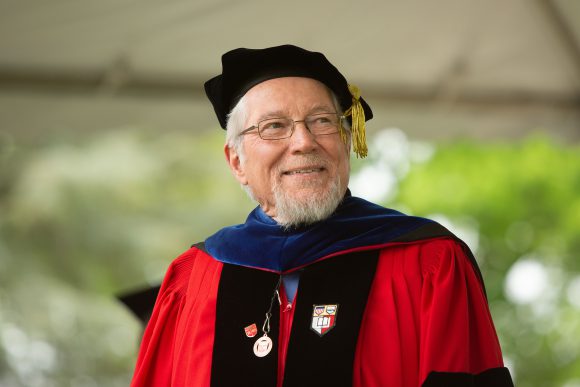
Executive Dean Robert M. Goodman, Rutgers School of Environmental and Biological Sciences 2018 Convocation. Photo: John O’Boyle.
Good morning!
I extend my congratulations and warmest best wishes to our graduates. I also want to express my thanks to friends and family who have supported your student scholars through their careers and life-building experiences here at Rutgers New Brunswick and its School of Environmental and Biological Sciences.
All of you have reached a life-goal in completing your course of study, and many of you have truly excelled. But this is just the beginning of your adult life’s work. Whatever the challenges that you have faced and overcome here, your lives ahead will offer many more, not just individually, but collectively.
I want to speak about the collective part. The future of global food supply, fresh water, biodiversity, governance, energy, and more, are all in question today. And all in the context of increasingly rapid climate change, some of it caused by human activity.
This is not to say that prior generations have failed, indeed many of the challenges are precisely because of prior successes. Moreover, fewer people today face dire food insecurity, or are threatened by chronic illness, or are marginalized by cultural or societal discrimination.
Yes, we still face severe diseases, food and nutritional insecurity, human trafficking, and discriminatory behaviors, some of them criminal and even crimes against humanity.
As human societies increasingly urbanize, as travel and global processes lead to biodiversity losses and spread of invasive species, the basic infrastructure of human life globally needs continuous re-investment, and more urgent attention than ever.
Many of you have experienced, and some have directly contributed to, a striking emergence here at Rutgers in the past few years of concerns about and programs to address the sustainability questions. These questions are a topic central to what we do here in the School, and it is both fitting and not at all surprising that our students, including many in this class, have made sustainability their issue.
A former faculty colleague and friend of mine, Jonathan Foley, now at the California Academy of Sciences wrote recently in an Essay as follows: “I would suggest that natural ecological systems on Earth succeed—often where humans do not—because they adhere to the following guidelines: They do not consume resources faster than they are regenerated by the environment; do not produce wastes, especially those that disrupt the environment and the climate system, faster than they are assimilated or removed by the environment; are highly diverse, making them more robust in the face of changing conditions; and power nearly everything they do with the Sun.”
He continues, “The scientific and technical challenges are enormous. But the most substantial change will be implementing them within the current political, social, and economic systems. We humans must ultimately respect the biological and physical limits of our world, and follow the lessons of the planet, if we hope to build a thriving and enduring civilization. The longer we delay doing so, the lower the chances of success. But the sooner we get started, the quicker we may be able to transition to a truly sustainable and prosperous future.”
Your education equips you to be contributors, and many of you to be leaders, in this global transition to a truly sustainable and prosperous future. Others have gone before you, for example, Lester R. Brown. Lester is a Rutgers graduate class of 1955, in agriculture, has set the course. Author, speaker, advocate, and leader, Lester is a ready example and exemplar of what one person can do toward the collective and global good.
Sitting before me today, I am sure that there are a number of you who can be the next Lester Brown. Look within yourself and ask, “What will I do with my future?” Find your answer, and make it your life’s commitment to building a better world.
Congratulations to you, Class of 2018!

